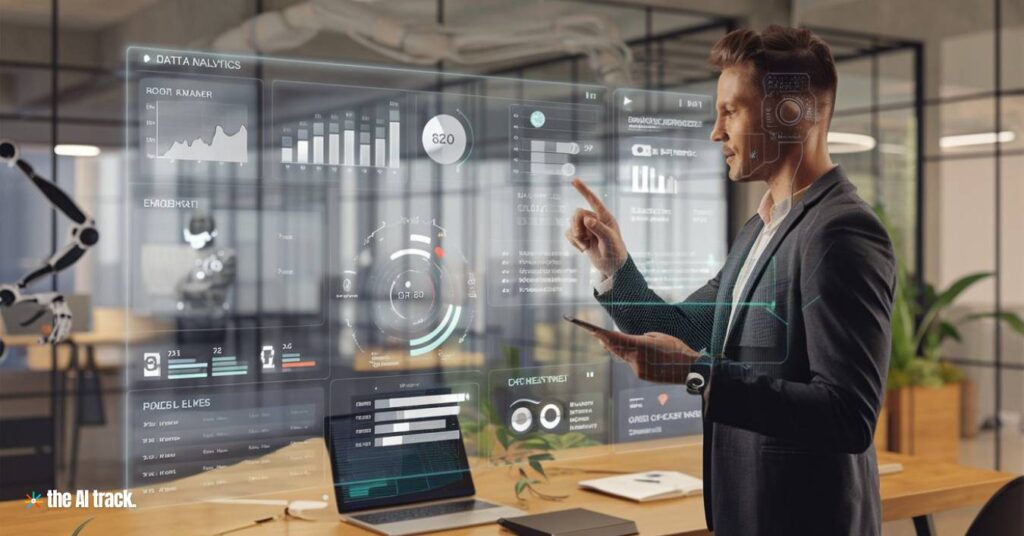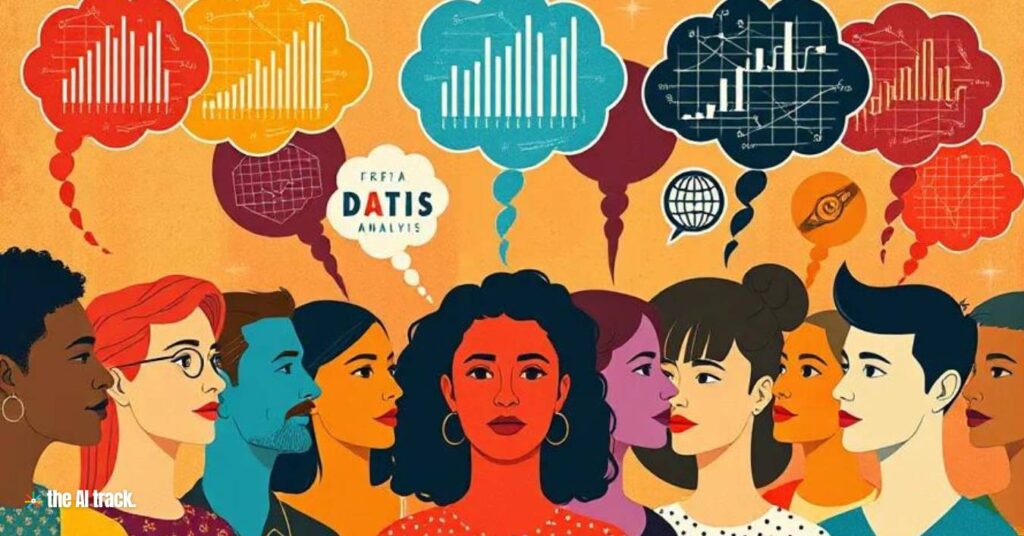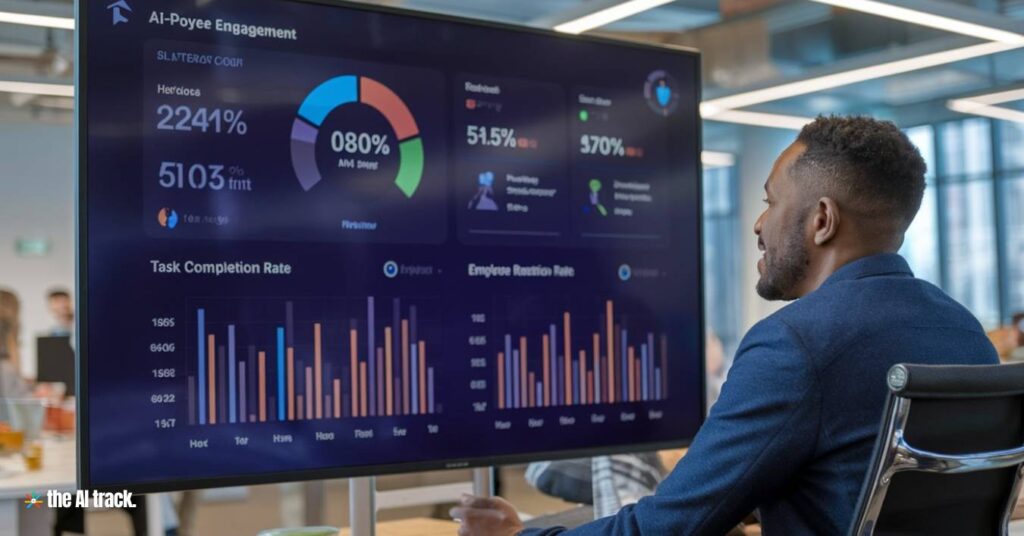AI in Business: A Game-Changer
Across the globe, hundreds of companies, from renowned giants like Alaska Airlines and Mercedes Benz to dynamic startups such as NotCo and Materiom, are weaving AI into their everyday operations. This widespread AI adoption isn’t just a passing trend—it signals a fundamental shift in the way businesses function and compete.
AI in business has quickly evolved from a futuristic concept into a current driving force that boosts efficiency, reimagines customer experiences, and opens up entirely new avenues for innovation.
This article dives into how some of the world’s biggest companies are leveraging AI in key areas—from customer service and employee productivity to cybersecurity and creative content creation.
Jump to Sections

Definitions of AI
To provide a foundational understanding, it’s essential to clarify what AI is and its multifaceted nature.
Artificial Intelligence (AI) can be seen through three core aspects:
- AI as a discipline,
- technologies that realize AI,
- and AI capabilities.
AI as a discipline involves studying systems that can simulate human intelligence, such as reasoning and problem-solving.
Technologies that enable AI include machine learning, natural language processing, and computer vision.
Finally, AI capabilities refer to how well an organization can leverage AI tools to meet business goals.
Understanding these distinctions helps make sense of AI’s widespread applications

AI in Business: Redefining Customer Service
AI has become a transformative tool in customer service, enabling businesses to deliver more personalized, efficient support.
At the forefront of this shift are AI-powered agents and chatbots.
For example, Alaska Airlines is developing a conversational AI chatbot designed to streamline booking processes and enhance overall customer satisfaction.
Similarly, Bennie Health uses AI to power its employee health benefits platform, offering actionable insights that simplify data management for both HR teams and employees.
Beyond 12, a nonprofit focused on tech in education, has created an AI-powered college coach that helps first-generation students via text, apps, and the web.
Real-Time Sentiment Analysis: Elevating Engagement
Beyond AI-powered customer agents, companies are also tapping into real-time sentiment analysis to boost customer engagement.
Aware, an AI company, uses technology to analyze employee communications on platforms like Slack, Microsoft Teams, and Zoom, helping businesses like Walmart, Delta Air Lines, and Starbucks identify potential issues based on employee sentiment. By spotting negative sentiment trends early, companies can address concerns proactively, improving not only the work environment but also customer interactions.
T-Mobile's IntentCX - Revolutionizing Customer Service
T-Mobile’s development of IntentCX represents a cutting-edge application of AI in customer support. This AI platform, built using OpenAI’s technology, goes beyond rule-based systems by analyzing billions of data points from customer interactions to provide highly personalized support.
IntentCX is transforming T-Mobile’s customer service approach, handling complex conversations while tailoring solutions to each customer’s needs. By offering real-time, data-driven engagement, the platform is helping optimize customer acquisition and retention strategies. It’s a prime example of how AI in business is creating more innovative, customer-focused solutions.
Radisson’s story illustrates how AI not only improves operational efficiency but also drives significant business growth.

AI in Business: Enhancing Sales Effectiveness
The integration of AI in business is revolutionizing not just customer service and employee productivity, but also sales processes. Generative AI in sales can lead to more effective lead scoring, personalized recommendations, and streamlined customer interactions, thereby boosting conversions and enhancing customer satisfaction.
Sales Automation for Efficient Lead Qualification
One of the key ways AI is transforming sales is through the automation of lead scoring and qualification. By analyzing customer data and behavior, generative AI can identify high-potential leads, allowing sales teams to prioritize their efforts more effectively. For instance, Best Buy leverages generative AI to empower sales associates by helping them access detailed customer insights and personalize their approach. This leads to a more engaging customer experience both online and in-store, ultimately enhancing sales outcomes.
Personalized Product Recommendations
Generative AI is also being utilized to offer hyper-personalized product recommendations. Mercedes Benz, for example, is enhancing its e-commerce platform by integrating a generative AI-powered smart sales assistant. This AI assistant provides personalized product suggestions based on customer preferences, enhancing the shopping experience and increasing conversion rates. Similarly, Etsy uses generative AI to optimize search recommendations, helping buyers discover relevant products and assisting sellers in growing their businesses.
Streamlined Sales Interactions
AI-powered chatbots and assistants are transforming customer interactions throughout the sales journey. ADT is building a customer AI agent to help millions of customers select, order, and set up their home security systems seamlessly. This use of AI reduces friction in the sales process and ensures that customers receive the right products for their needs without manual intervention from sales representatives. Magalu, a major Brazilian retailer, also uses generative AI to power its popular brand persona, “Lu,” providing an interactive, conversational sales assistant that enhances customer engagement and boosts sales.
Boosting Sales Team Productivity
Beyond customer-facing roles, AI is also enhancing internal sales team productivity. Cintas uses Vertex AI to develop an internal knowledge center that allows sales teams to quickly find key information, reducing the time spent searching for resources. This enables sales representatives to spend more time on high-value tasks, such as nurturing client relationships and closing deals. Woolworths also leverages generative AI to assist sales reps by summarizing customer interactions in real time, ensuring that sales associates are well-prepared for every client interaction.
Salesforce - AI-Powered Sales Optimization
Salesforce has integrated generative AI into its sales processes to help representatives work smarter and close deals faster.
The AI system analyzes historical sales data, customer interactions, and market trends to provide actionable insights. By offering personalized sales tactics and predicting customer needs, Salesforce’s AI-driven approach has increased win rates by 30%.
These use cases highlight how generative AI is becoming an indispensable tool for modern sales teams, enabling businesses to streamline operations, boost productivity, and create more personalized, engaging sales experiences.

AI in Business: Revolutionizing Software Development
The integration of AI into software development is reshaping how companies approach coding and deployment. AI-assisted coding tools are helping businesses produce higher-quality software faster than ever before.
AI-Assisted Coding for Faster Software Development
Honeywell’s partnership with Microsoft shows how AI is accelerating software development. Using GitHub’s AI-powered tools, Honeywell’s developers are now producing 90,000 lines of code weekly, with 65% of the work supported by AI coding assistance.
Similarly, Leroy Merlin uses Google’s Vertex AI platform to summarize code changes, speeding up the development process for its engineers.
Streamlining Development Cycles and Improving Code Quality
AI is also boosting the speed and quality of software development.
Wayfair, for instance, piloted Google’s Code Assist tool and saw a 55% faster environment setup time, with a 48% improvement in code performance. Developers reported that this AI tool allowed them to focus on more meaningful and satisfying work, underscoring AI’s potential to enhance both efficiency and job satisfaction in software development.
Labelbox – Elevating AI Model Accuracy
Labelbox’s integration with Google’s Vertex AI illustrates how AI in business can improve AI models themselves. Labelbox uses AI to enhance model evaluation by incorporating human feedback, ensuring that AI systems are more accurate and trustworthy. This shows that AI can be used to create even better AI systems, leading to higher reliability in machine learning applications.

AI in Business: Uncovering Insights and Enhancing Decision-Making
AI is revolutionizing how companies analyze data, unlocking insights from complex datasets that were previously out of reach. This is enabling businesses to make smarter decisions and optimize strategies across the board.
Discovering Hidden Trends and Patterns
Bayer Crop Science’s Climate FieldView platform is a prime example of how AI in business can analyze data for real-world applications. By crunching billions of data points, the platform gives farmers actionable insights on how to optimize yields and reduce emissions.
Similarly, CME Group is developing an AI-powered trading platform that helps traders make smarter decisions by providing deeper insights without disrupting their existing workflows.
Supporting Strategic Planning
NotCo, a Chilean food tech company, has improved its internal processes with the help of an AI chatbot powered by Google’s Gemini. This AI-driven tool allows employees to access real-time insights, speeding up decision-making.
SURA Investments, Latin America’s largest asset manager, also uses AI to analyze customer data, enhancing both customer understanding and satisfaction.
Fullstory - Personalizing Chatbot Interactions
Fullstory is a platform that leverages AI to analyze user behavior, allowing companies to tailor their chatbot interactions more precisely. By understanding how users navigate websites, businesses can create more personalized and relevant chatbot responses, significantly improving customer experiences.

AI in Business: Empowering Employees and Enhancing Productivity
The role of AI in business isn’t limited to customer-facing functions; it’s also revolutionizing the way employees work, leading to greater productivity and job satisfaction. AI is increasingly used to automate repetitive tasks, freeing up employees to focus on more strategic work.
Automation of Routine Tasks: From Mundane to Meaningful
JPMorgan Chase is rolling out an AI assistant powered by OpenAI across its workforce of over 60,000 employees. This assistant handles routine tasks such as drafting emails, summarizing documents, and assisting with Excel tasks, allowing employees to concentrate on higher-value activities.
Similarly, Honeywell uses an AI assistant from Moveworks to automate various functions, significantly reducing IT help desk tickets by 80%. With AI taking care of simpler tasks, IT professionals can focus on more complex technical challenges.
Accessing Information for Smarter Decisions
AI is also helping employees access and manage vast amounts of data more efficiently.
At Honeywell, Microsoft’s AI-powered Copilot in Microsoft 365 allows workers to retrieve data from across the company with ease, streamlining decision-making.
Honeywell has even developed its own generative AI assistant, Red, which lets employees quickly search through over 350,000 product manual pages and 50,000 internal articles in more than 100 languages.
Randstad - Promoting Diversity and Inclusion with AI
Randstad, a global HR services provider, demonstrates how AI in business can foster diversity and inclusion. By implementing Google’s Gemini AI tools, Randstad has transformed its corporate culture, resulting in a more inclusive environment and measurable improvements in employee satisfaction and attendance.
This case highlights the broader social impacts that AI can have within organizations, proving that it’s not just about efficiency but also about fostering positive cultural change.

AI in Business: Enhancing Human Resources and Talent Management
AI’s role in HR is growing rapidly, from automating recruitment to enhancing employee engagement and training. AI helps HR teams work more effectively, ensuring a more inclusive and productive work environment.
Recruitment and Onboarding
Generative AI is transforming the recruitment process by automating resume screening and interview scheduling. Randstad, a global HR services provider, uses Google’s Gemini AI tools to foster diversity and inclusion, which has resulted in a more equitable hiring process and improved employee satisfaction. Pennymac also uses AI to streamline hiring and onboarding, accelerating the entire recruitment process.
Employee Engagement and Training
AI also enhances employee engagement by providing personalized training and resources. Honeywell uses AI assistants to reduce IT help desk tickets by automating responses, freeing employees from repetitive tasks and enabling them to focus on more impactful work. Woolworths utilizes AI to help administrative employees improve their communication skills, which contributes to greater job satisfaction and retention.
Robert Bosch - Revolutionizing HR with AI
Robert Bosch, the world’s largest automotive supplier, has adopted AI-powered solutions to streamline HR processes across over 100 decentralized departments. By automating resource allocation and optimizing workflows, Bosch has maximized HR efficiency, resulting in improved employee experiences and greater operational effectiveness.
This case highlights the broader social impacts that AI can have within organizations, proving that it’s not just about efficiency but also about fostering positive cultural change.

AI in Business: Transforming Creative Content Generation
AI is changing the game when it comes to producing creative content, allowing businesses to generate engaging and tailored material at an unprecedented scale. This section looks at how AI is revolutionizing the creation of everything from marketing copy to visual assets.
AI-Driven Content Creation and Personalization
Take Adore Me, for example. This lingerie company has harnessed AI to drastically speed up its content creation. By using Google’s Gemini for Workspace, their marketing team now drafts unique product descriptions in just one hour—a task that used to take them 30 to 40 hours each month.
Over in Latin America, Globo, the region’s largest media group, is using Google Cloud’s AI to personalize streaming content for users, boosting engagement by tailoring experiences to individual preferences.
Meanwhile, Jasper, an AI platform specializing in creative content, employs Google’s advanced AI infrastructure to train its writing and marketing models, helping companies of all sizes produce high-quality, on-brand content quickly and effectively.
Enhancing Images and Videos with AI
The power of AI extends beyond written content to visual media too. For instance, Puma leverages Google’s Imagen technology to customize product photos for different regions, making sure images resonate with local markets. This has already resulted in a 10% boost in click-through rates for Puma India.
Similarly, Canva, the popular graphic design platform, uses Vertex AI to fuel its Magic Design for Video tool, which simplifies video editing and allows users to create professional-quality videos in seconds.
Radisson Hotel Group – Personalizing Advertising for Greater Revenue
Radisson Hotel Group shows just how impactful AI can be in advertising. By partnering with Accenture, they implemented AI tools from Google, such as Vertex AI and Gemini, to personalize their ad campaigns. The results speak for themselves—a 50% increase in ad team productivity and a 20% jump in revenue from these AI-powered campaigns.
Radisson’s story illustrates how AI not only improves operational efficiency but also drives significant business growth.

AI in Business: Transforming Marketing and Advertising
The impact of AI on marketing and advertising is profound, extending beyond creative content generation into optimizing entire marketing campaigns, personalizing ads, and automating strategy execution. AI helps companies analyze customer behavior in real time, allowing for targeted advertising and enhancing overall marketing effectiveness.
Campaign Optimization and Targeted Advertising
Generative AI can significantly optimize marketing campaigns by analyzing consumer data to create highly targeted advertisements. Mercedes Benz, for instance, utilizes generative AI to personalize marketing campaigns, ensuring that content is tailored to individual preferences, which enhances engagement rates. Similarly, Radisson Hotel Group has used AI to personalize its advertising efforts, leading to a 50% increase in ad team productivity and a 20% growth in revenue.
Marketing Automation and Real-Time Insights
Generative AI also supports marketing automation, which allows teams to execute campaigns more efficiently. Adore Me harnesses AI to accelerate the creation of marketing copy, reducing the time spent on content production from hours to just minutes. This increased efficiency frees up marketers to focus on strategic activities. Canva leverages AI to streamline video content creation, enabling marketing teams to produce engaging visuals quickly, which helps maintain a consistent brand presence.
Carrefour - AI-Powered Marketing Studio
Carrefour implemented Vertex AI to deploy Carrefour Marketing Studio, a tool that enables its marketing team to create dynamic and ultra-personalized campaigns in just a few clicks.
This AI-driven solution has greatly improved the efficiency of Carrefour’s marketing strategy, allowing for rapid adjustments and better targeting, which ultimately drives higher customer engagement and improved sales outcomes.

AI in Business: Transforming Finance and Risk Management
AI is becoming a key player in finance, transforming everything from credit scoring and risk assessment to financial advisory services. Financial institutions are increasingly adopting AI to improve accuracy, reduce manual work, and enhance compliance monitoring.
Credit Scoring and Risk Assessment
AI helps financial institutions assess creditworthiness more accurately by analyzing extensive datasets, allowing for better risk management. BBVA uses Google SecOps to detect and respond to security threats swiftly, enhancing its risk assessment processes. AI tools enable institutions to automate credit scoring, minimizing biases and improving decision-making transparency.
Automated Financial Advisory and Compliance
Generative AI is also being used for automated financial advisory services, offering personalized investment suggestions to clients. SURA Investments employs AI to analyze customer data and enhance customer satisfaction by providing tailored recommendations. This automation not only saves time but also enhances the accuracy of financial advice. JP Morgan Chase has also implemented AI-based solutions to automate document analysis, saving significant time and improving efficiency.
Charles Schwab - AI-Driven Financial Risk Management
Charles Schwab has integrated AI into its security threat response processes. By combining their internal intelligence with Google’s AI tools, Schwab has significantly improved its ability to prioritize and manage risks.
This integration demonstrates how AI is not only enhancing operational efficiency but also improving financial security, leading to a more resilient business model.

AI in Business: Revolutionizing Supply Chain and Logistics
AI is transforming supply chain management by optimizing demand forecasting, route planning, and warehouse automation. The integration of AI into logistics has helped companies like Walmart and UPS streamline their operations, reduce costs, and improve efficiency.
Demand Forecasting and Inventory Management
AI’s predictive capabilities are being used extensively to optimize inventory levels and ensure products are available when needed. Walmart leverages AI to predict customer demand accurately, allowing for better stock management and minimizing overstock or stockouts. Tokopedia, an Indonesian e-commerce leader, uses Vertex AI to enhance data quality, thereby improving the accuracy of demand forecasting and inventory management.
Route Optimization and Logistics Planning
AI also plays a critical role in logistics by optimizing delivery routes and reducing operational costs. UPS is developing a digital twin of its entire distribution network to help improve route planning and package tracking, which enhances both efficiency and customer satisfaction.
The Central Texas Regional Mobility Authority - AI-Driven Transportation Optimization
The Central Texas Regional Mobility Authority uses Vertex AI to modernize transportation operations, ensuring a smoother and more efficient journey for travelers.
By incorporating AI into logistics planning, they have been able to optimize routes and improve service levels, reducing travel times and enhancing the overall transportation experience.

AI in Business: Strengthening Cybersecurity
AI is quickly becoming a critical tool in cybersecurity, helping companies detect threats faster and manage risks more effectively.
AI-Driven Threat Detection
Apex Fintech uses Google’s Gemini AI in its security systems, enabling it to write complex threat detection rules in seconds, drastically speeding up its response times.
Similarly, Exabeam’s generative AI-powered security assistant provides real-time insights to analysts, improving threat detection and response.
Fraud Prevention and Compliance Monitoring
Companies like Grupo Boticário and BBVA are relying on AI to detect fraudulent activities and strengthen their overall security posture. AI allows them to analyze massive datasets quickly and with greater accuracy, significantly reducing the time it takes to identify potential risks.
Palo Alto Networks – Continuous Security Support
Palo Alto Networks demonstrates how AI can offer 24/7 cybersecurity support. Their AI assistant, built with Google’s Gemini, provides real-time, round-the-clock support tailored to the company’s specific security protocols. This ensures that Palo Alto Networks can stay ahead of evolving cyber threats, keeping its systems and customers safe.

Industry-Specific AI Applications
The role of AI varies significantly across industries, from automating routine tasks to driving strategic decision-making.
In IT operations, for example, AIOps—AI for IT operations—helps teams sift through large datasets to quickly detect anomalies and enhance system performance.
In marketing, AI tools analyze customer data to forecast trends and tailor campaigns, ensuring targeted outreach and improved customer satisfaction.
In finance, AI-driven fraud detection systems are revolutionizing how financial institutions monitor transactions and identify suspicious activities.
For instance, Mastercard’s AI system has been able to reduce false declines by 50%, helping to enhance customer experience while improving security.
JP Morgan Chase has also implemented an AI-based document review tool called COIN, which handles legal document analysis, saving approximately 360,000 hours of work annually.
In healthcare, AI applications like IBM’s Watson are being used to analyze patient records and recommend personalized treatment plans. AI-driven diagnostic tools are also enhancing the accuracy of medical imaging, reducing diagnostic errors and allowing doctors to focus more on patient care.
In retail, AI is transforming supply chain management and customer experiences. Walmart uses AI to predict customer demand and optimize inventory levels, reducing overstock and ensuring that products are always available.
Meanwhile, Sephora’s Virtual Artist tool leverages AI to offer personalized makeup recommendations, thereby enhancing customer engagement and boosting sales.

AI Best Practices for Business Success
For companies aiming to maximize AI’s impact, adopting best practices is crucial.
McKinsey’s research shows that high-performing companies treat AI as a scalable asset, adopting MLOps (Machine Learning Operations) to streamline development and deployment. MLOps enables businesses to automate model training and deployment, much like the efficiencies of a car assembly line.
Cloud infrastructure plays a key role here, offering off-the-shelf tools and scalability.
Adopting these practices allows companies to predictably achieve significant returns on AI investments.
AI in Business: Comprehensive Use Cases Summary Table
This summary table offers a detailed overview of how AI is transforming various business functions across different industries. It includes real-world examples, key statistics, and significant outcomes, providing a quick reference for understanding the wide-reaching impact of AI in business. From enhancing customer experience and automating routine tasks to driving data insights and revolutionizing logistics, this table encapsulates the diverse applications of AI and their benefits.
| Company | AI Application | Key Statistic/Takeaway | Industry |
|---|---|---|---|
| Pfizer | Cybersecurity Data Aggregation | Reduces analysis times from days to seconds | Healthcare |
| Charles Schwab | Security Threat Response | Integrates its intelligence with Google SecOps to prioritize work and respond to threats more effectively | Financial Services |
| Adore Me | Content Creation (Product Descriptions) | AI reduced time spent writing product descriptions from 30-40 hours per month to one hour | Retail |
| Target | Data Analysis | Utilizes AI to organize and analyze large amounts of data | Retail |
| Walmart | Inventory Management | AI-powered system optimizes stock management, accounting for regional needs and buying habits | Retail |
| T-Mobile | AI-Powered Customer Service Platform | Developing IntentCX with OpenAI to better understand customer intent and deliver personalized solutions | Telecommunications |
| Mercedes Benz | Personalized Marketing and Sales | Uses generative AI to personalize marketing campaigns and recommend products based on customer preferences | Automotive |
| Randstad | Recruitment and Inclusion | Uses Google’s Gemini AI tools to foster diversity and inclusion | HR Services |
| Robert Bosch | HR Process Automation | AI-powered solutions streamline HR processes across over 100 departments | Automotive |
| UPS | Route Optimization and Logistics | Developing a digital twin of its network to improve route planning | Logistics |
| Honeywell | Employee Productivity | AI assistant reduces IT help desk tickets by 80% | Technology |
| Canva | Video Content Creation | Streamlines video editing to create professional-quality visuals | Creative Services |
| SURA Investments | Automated Financial Advisory | Uses AI to analyze customer data and enhance customer satisfaction | Financial Services |
| Salesforce | AI-Powered Sales Optimization | Increased win rates by 30% through AI-driven sales tactics | Software Services |
| Carrefour | Marketing Campaign Personalization | Implemented Vertex AI to create dynamic campaigns, driving higher engagement | Retail |
| Central Texas Regional Mobility Authority | Transportation Optimization | Uses Vertex AI for route optimization, ensuring smoother journeys | Public Sector |
Credit: The AI Track

Ethical Considerations and the Path Forward
As businesses increasingly integrate AI, it becomes critical to address the ethical implications of this technology. From concerns around data privacy to potential bias in algorithms, responsible AI development is key to building trust and ensuring sustainable success.
Data Privacy and Employee Monitoring
AI’s ability to collect and analyze vast amounts of data can lead to privacy concerns, particularly when it comes to employee monitoring. Aware, a company specializing in AI, offers technology that analyzes messages sent on platforms like Slack and Microsoft Teams. Although Aware claims its data aggregation is anonymous, privacy advocates argue that full anonymization is difficult, and even aggregated data can sometimes expose sensitive information. There’s also the risk of “thought crime,” where an employee’s sentiments are monitored and used against them, raising serious ethical questions about personal privacy in the workplace.
Bias, Fairness, and Transparency
Another major concern is the potential for bias within AI systems. Since these algorithms are often trained on historical data, they risk perpetuating societal biases, leading to unintended discrimination. For instance, biased training data has resulted in unfair hiring practices or the denial of loans to certain demographic groups.
Implementing ethical guidelines and risk management frameworks can help mitigate these issues. Companies need to prioritize diversity in their AI teams and involve diverse voices in the development process.
Harvard experts suggest that companies should begin with establishing a set of core ethical values and use these to guide AI development and evaluation processes.
The Future of AI in Business
Looking forward, AI is poised to merge more deeply with everyday infrastructure and services.
Harvard experts predict a fusion of cognitive technologies with physical environments, often referred to as ‘cognification.’ This means infrastructure that is more responsive and integrates augmented reality, changing how businesses operate and serve customers.
Another emerging trend is the rise of generative AI, which is set to make significant inroads in creative content production, transforming how companies approach advertising, design, and media

Conclusion
Restating the Main Idea
Throughout this article, we’ve seen how AI is transforming business operations across multiple sectors, driving substantial gains in efficiency, productivity, and customer satisfaction. From improving data analysis and cybersecurity to streamlining creative content production, AI’s impact is profound and far-reaching.
Final Thoughts
The road ahead for AI in business is filled with exciting opportunities as well as complex challenges. By approaching AI development responsibly and promoting ongoing discussions about its ethical implications, businesses can ensure they harness this powerful tool to build a more innovative, equitable, and prosperous future.
Key Takeaways
- AI enhances customer service, optimizing personalization and efficiency.
- Generative AI boosts sales through lead scoring, recommendations, and improved customer interactions.
- AI transforms marketing by optimizing campaigns, automating content, and personalizing ads.
- AI improves supply chain management, enhancing inventory accuracy and route optimization.
- AI in HR supports recruitment, onboarding, employee engagement, and process efficiency.
- AI-driven tools accelerate software development and enhance decision-making through data insights.
- Finance benefits from AI in credit scoring, risk management, and personalized financial advisory.
- AI aids content creation, cybersecurity, and industry-specific needs across healthcare, finance, and retail.
Sources
- Real-world gen AI use cases from industry leaders | Google Cloud Blog, September 24, 2024
- 185 real-world gen AI use cases from the world’s leading organizations | Google Cloud Blog, September 24, 2024
- Automating and Enhancing Business Processes with ChatGPT | Analytics Insight, March 5, 2024
- How Walmart, Delta & Starbucks are using AI to check employee messages | CNBC, February 9, 2024
- America’s emerging AI leaders: Amazon, Walmart and Wells Fargo? | Semafor, October 2, 2024
- Fortune or fiction? The real value of a digital and AI transformation in CPG | McKinsey, 3 October 2024






